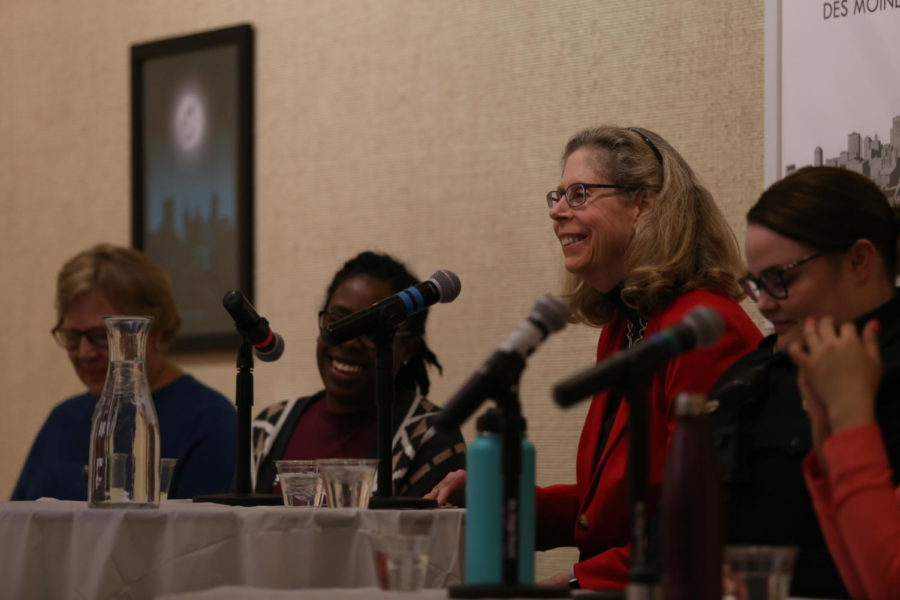Leaders at ISU discuss experiences at Women’s Empowerment Night
Danielle Peterson/Iowa State Daily
Sally Deters, Jazzmine Brookes, President Wendy Wintersteen, and Natasha Greene were four of the five women on the women’s empowerment night panel. The women talked about their experiences in their fields dealing with being a women. The panel was held Wednesday March 6 in the Memorial Union.
March 6, 2019
Iowa State hosted a Women’s Empowerment Night on Wednesday that included a panel of speakers who shared their stories as women and gave advice to the audience.
The panel of women spoke at 7 p.m in the Gallery Room of the Memorial Union. The speakers included Iowa State President Wendy Wintersteen, Sally Deters from the Department of Residence, Jazzmine Brooks from Green Dot, Natasha Greene with Iowa State University Police Department and Som Mongtin from the Margaret Sloss Women’s Center.
The event included personal stories from each speaker on how they have faced adversity based on their gender.
President Wintersteen shared a story from early in her career in a professional environment.
“I was in a room where I was the only woman around,” Wintersteen said. “A man came up to me and asked me to get him a cup of coffee.”
Deters also shared a story from earlier in her career when she discovered a difference in pay between her and a male co-worker.
“I confronted my boss about getting paid less and he responded with, ‘it’s because they’re men with families,’” Deters said. “I said, ‘What if I had a family then?’ Without skipping a beat he said, ‘then you wouldn’t be here.’”
Som Mongtin, a former Iowa State student who now works for the Sloss Center. While a student at Iowa State, she said she experienced oppression from her academic adviser.
“I went into my academic adviser and told him I wanted to take physics,” Mongtin said. “He told me maybe we should think about it more. Shortly after, I got a new adviser, who was a female, and she signed me up for physics. What I’ve learned as a professional is, you just have to listen to what people are good at and trust them.”
Jazzmine Brooks works for Green Dot at Iowa State. She shared her experience as a female in the workplace and what she learned from it.
“Being a black woman who was overseeing 800 residents, evaluation time was always really stressful,” Brooks said. “What I learned was when people are talking to you in a demeaning way, it’s coming from something going on with them, not you. Understand women’s stories, and as much as we are all women, we all come from different backgrounds.”
Natasha Greene is a member of the Iowa State Police Department. She shared her personal account as a female police officer. While she said her experience at Iowa State has been positive, she said that at the state level, Greene experienced adversity based on her gender.
“I joined the law enforcement because I wanted to help those affected by domestic violence and racial discrimination by law enforcement,” Greene said. “Because I work in a predominantly male field, I was always asked, ‘Were you the diversity hire?”’One day when I was at the firing range, I had my sleeves rolled up because it was hot out. Someone said to me, ‘This isn’t a tanning salon.’”
Wintersteen discussed the importance of self discovery for women at Iowa State. “I think it’s so important that while you are at Iowa State, you take the time to get to know yourself deeply so you can believe in yourself,” Wintersteen said. “To know what your ethics are, what your values are, and if you take the time to do that now, you won’t get discouraged by someone who challenges that. That will give you the foundation to believe in yourself. It’s so important to be authentic and know who you are.”
Deters gave context to how gender inequalities can be spotted in society.
“When Hillary Clinton was running for President, one of the things that people found most newsworthy was the cost of her pantsuit,” Deters said. “We don’t hear people asking that of male candidates.”
Deters also gave advice to females in the workplace.
“It’s important to watch how people present their power,” Deters said. “Many times, men will stand over a woman to talk with her. We need to learn to say, ‘would you like to sit down?’ and if they say no, we need to learn to stand up.”
The event also featured several on-campus resources for women such as Student Wellness and the Sloss Center. Each had booths set up for students to learn more about them and their services.
















